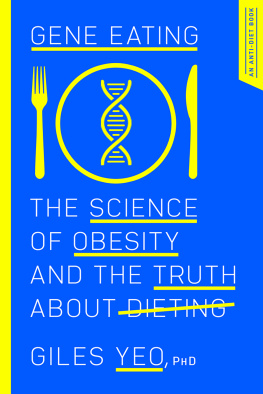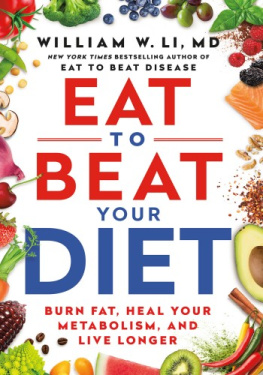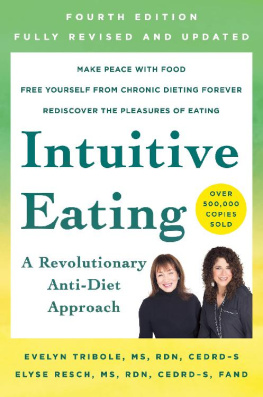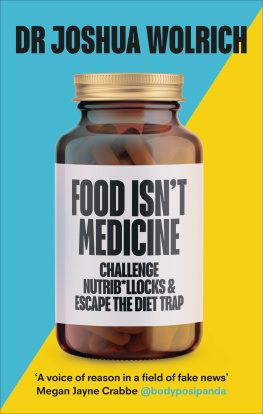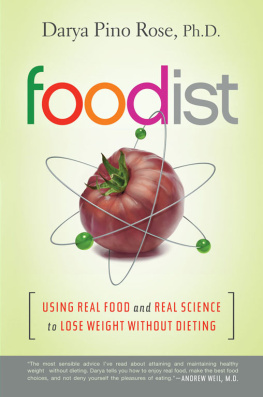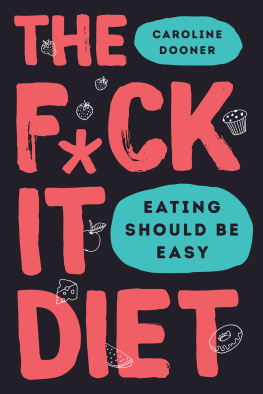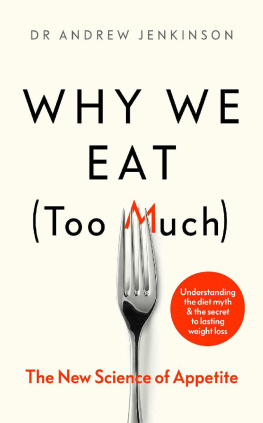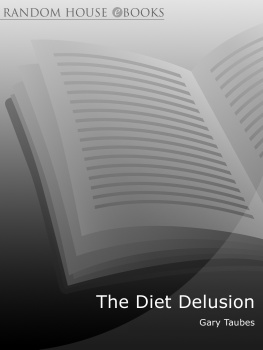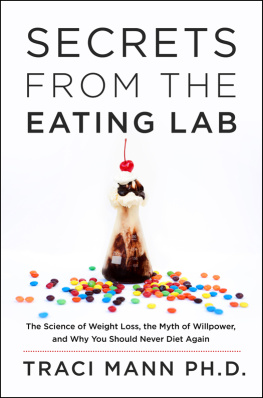Contents
Guide

GENE EATING
_____________________________
THE SCIENCE OF OBESITY AND THE TRUTH ABOUT DIETING
GILES YEO, PHD

G ENE E ATING
Pegasus Books, Ltd.
148 West 37th Street, 13th Floor
New York, NY 10018
Copyright 2019 by Giles Yeo, PhD
First Pegasus Books hardcover edition June 2019
All rights reserved. No part of this book may be reproduced in whole or in part without written permission from the publisher, except by reviewers who may quote brief excerpts in connection with a review in a newspaper, magazine, or electronic publication; nor may any part of this book be reproduced, stored in a retrieval system, or transmitted in any form or by any means electronic, mechanical, photocopying, recording, or other, without written permission from the publisher.
Library of Congress Cataloging-in-Publication Data is available
ISBN: 978-1-64313-127-6
ISBN: 978-1-64313-169-6 (ebk.)
For Jane
CONTENTS
It was the first day of filming for the BBC Horizons Clean Eating programme a documentary investigating the dirty truth behind pseudoscience fad diets and we were heading into the hills north of San Diego to meet with Dr Robert O. Young, father of the alkaline diet. I signalled left and moved smoothly into the fast lane on Interstate 15, as I headed north out of San Diego on a warm September morning. Normally, the rental vehicles utilised by the BBC are, well, rental-like; functional people mover caravan-type things, which allow for the crew and all of their associated gear to be jammed in the back. On this sun-kissed Californian day, however, I was driving a silver Ford Mustang convertible, with the top down. The ridiculously large engine growled in response to the slightest squeeze of my right foot on the accelerator, while the wind blew through my hair ... or at least it would have if I had any hair. I was living the dream!
Just over an hour later, I drove through some groves of avocado trees, and entered a millionaires paradise that has become known as the pH Miracle Ranch. Roberts pH Miracle series of books have sold more than four million copies, and this beautifully manicured ranch is the epicentre of his multi-million dollar alkaline empire. I manoeuvred the Mustang through the open gates of the white stone entrance down the long drive, and was soon joined by the crew, who had been following along behind in a far more sedate and rental-like Dodge Caravan.
The front door, preposterously set behind a moat, is reached by walking across some stone slabs. As Robert welcomed me in, crew in tow with cameras rolling, my eyes were drawn to an empty spherical fish-tank built into the wall that separated the living area from the kitchen. Noting my interest, Robert began to share his alkaline view of the world, starting with what he called the fish bowl metaphor.
If the fish is sick what would you do? Treat the fish or change the water?
He went on: The human body in its perfect state of health is alkaline in its design.
Like many of the fad diets that are currently en vogue, this one begins with a kernel of truth. The pH of our blood is 7.4, which is slightly alkaline, so Robert is broadly correct; although different compartments of our bodies, such as our stomach, function at very different pHs. Everything else about alkaline living however, is complete fantasy. Robert believes that in order to maintain the alkaline pH of our blood, we have to eat alkaline foods. The problem is, there is NO evidence that your bloods pH is influenced by what you eat. Your stomach, at around pH 1.5 (stronger than lemon juice or vinegar), is the most acidic environment in your body. So whatever you eat will arrive in your intestine at the same acidic pH. In fact, nothing apart from almost dying will change your bloods pH.
Why has the alkaline phenomenon exploded, if the (pseudo) science behind it doesnt even stand up to casual scrutiny? For that matter, why do people buy into clean-eating, or plant-based, or detox, or juice cleansing, diets?
GETTING LUNCH? ITS A JUNGLE OUT THERE!
Has there ever been a time in history where there have been so many dietary options? I mean, there is gluten-free, dairy-free, fat-free, nut-free, egg-free, sugar-free, shellfish-free ... the list goes on. I was lining up for coffee the other morning and the lady in front of me asked for a grande soy-decaf-latte with a shot of sugar-free caramel! (Say that quickly three times in a row after youve had a few too many.)
A few years ago, for the first time, I saw a festive advertisement campaign from a major supermarket chain inviting potential customers to Have your Free-From Christmas celebrations with us! Now, call me a cynic, but I do not think that the Free-From festive ad campaign was solely aimed at the 1 per cent of the population that suffer from coeliac disease (who are allergic to gluten and therefore have to stay away from it). Nor do I, for one moment, imagine that the proliferation of non-dairy substitutes, such as soy, oat or almond milks, by major coffee purveyors is part of a drive to attract more lactose-intolerant customers (such as myself, although my preferred poison, not by chance, is a black Americano). Nope, these Free-From foods are being marketed as more healthy.
The term healthy is, I would argue, in the eye of the beholder. If you have a broken leg, you want your leg to heal. If you have heart disease or cancer, well then, healthy would mean to rid yourself of disease. And for many overweight and obese people out there, being healthy would mean to lose weight.
Our modern lifestyle, coupled with the food environment, has made obesity the biggest public health problem of today, with up to 30 per cent of people in many countries carrying way too much fat. Aside from occasionally moonlighting as a science presenter for the BBC, I am first and foremost a scientist at the University of Cambridge, studying the control of bodyweight I am an obesity geneticist. I, and many others, have spent the last two decades trying to understand what is perceived by most people on the planet as quite a simple problem. This is, by far and away, the prevailing view, and it is easy to see why. People just have to eat less and move more and they will lose weight. It is one of the fundamental laws of physics; you cannot magic calories out of nowhere, and likewise you cannot magic weight away.
The question to ask, however, is not how we have become obese (we do eat too much and move too little), but WHY some people eat more than others. The answer to this question is hugely complex, and we are only now beginning to reveal and understand the powerful genetic and biological influences on food intake. In doing so, other salient questions have emerged. Why do some people put on weight easily while others can apparently eat whatever they want? How come some folks find it harder to lose weight than others? Why is the battle to maintain a healthy weight so difficult for so many? The fact of the matter is that while simplistic eat-less advice will work for some, for most of us, losing weight and then trying to keep it off is incredibly difficult. It is not what we are evolved to do, and the reality is, while we are making progress in understanding the problem, an all-encompassing solution remains out of reach. In this book, I will place the obesity epidemic in perspective, by explaining our current understanding of how food intake is controlled, how this differs between people, and how our genes influence our interaction with the environment. Science is set-up to get to the truth ... eventually. It is not designed to provide quick answers. So here we are with an enormous contemporary problem of obesity and other diet-related illnesses, and a complete lack of quick and easy answers. As a result, there are many desperate people looking for a way out, a silver bullet.

